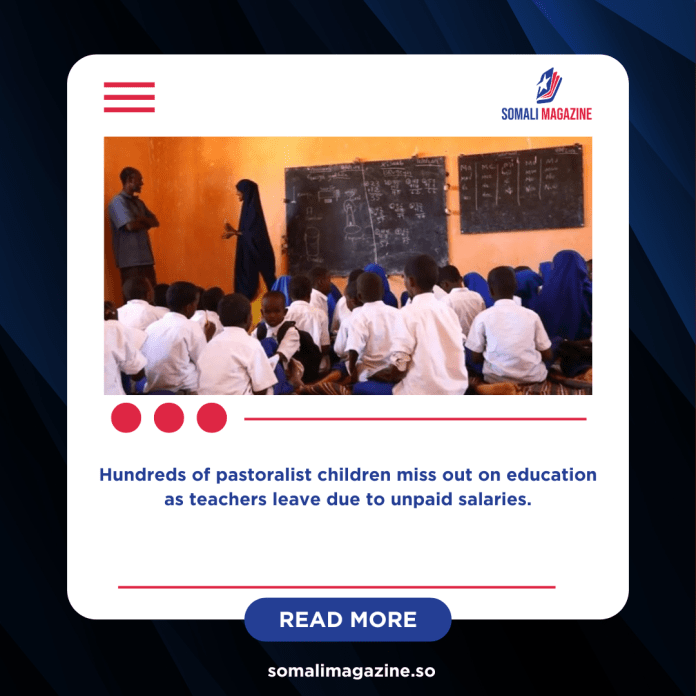Facebook Twitter (X) Instagram Somali Magazine - People's Magazine
Free community schools supported by the Galmudug education authority have failed to open in several parts of Adado district this school year because of a lack of funding. As a result, about 450 children from pastoralist families in the rural areas of Gelinsor, Wadgelinsoor, Far-janno, and Qurdubanle were left without education when classes were supposed to start in September.
The schools had been run with help from humanitarian organisations, but when donor funding stopped, the education authority could no longer afford to pay teachers’ salaries. Most of the teachers left, leaving hundreds of children at home.
Among the affected parents is Abdi Mahmoud Hassan, a father of seven in Qurdubanle. Six of his children were attending primary and intermediate school before the closure. He said the schools had given his children hope for a better future, but that dream has now disappeared. “There’s no education at all. Everything has fallen apart. We never had proper classrooms, the lessons were under trees, but at least the children were learning. Now the teachers have gone, and most parents can’t afford other schools,” Abdi said.
The parents tried collecting money to pay the teachers themselves, but the amount raised was not enough. The region has been hit hard by drought, and most families depend on livestock that are now weak and unproductive. Abdi said his herd of 50 goats can no longer be sold, leaving his family with no income. They survive on one meal a day, mostly supported by relatives in Adado.
Abdi is also struggling with debt. Local shopkeepers who once gave him food on credit have now refused to serve him until he clears his debts, which amount to thousands of dollars. “One shop I owe $5,000 and another $3,000. They’ve both refused to help me again. Everyone is struggling. No one can afford to lend me food anymore,” he said. He has tried finding manual jobs in Adado but has not been successful.
Another parent, Fadumo Elmi Abdi, is facing a similar situation. Her three children, who were attending lower and intermediate classes, are now idle at home after their school in Qurdubanle closed. She said the children had made good progress in the two years they were in school, but with no teachers now, they are falling behind. “The children have started picking up bad habits because they have nothing to do. They’re young, and when youth are idle, they easily get into trouble,” she said.
Fadumo’s family also depends on help from neighbours. Their herd of 30 goats, once their main source of income, has lost value due to drought and lack of pasture. She fears the animals may not survive unless it rains soon. The cost of trucking water from Adado is also too high for them to manage. “A small water truck costs about $50 or $60, and we can’t afford it. We only have two jerrycans left. Water is the biggest problem now,” she said.
Her family owes about $800 in debts for food and water, and her creditors have given her only a month to repay. The pressure has left her anxious about the future.
The closure of these free schools has deeply affected families in several villages. Adado district’s education coordinator, Hussein Ali Sahal, said they are trying to reopen the schools, but funding remains a serious challenge. He explained that humanitarian groups such as CERA International, JOSBO, and Save Somali Children had been paying teachers’ salaries but ended their projects this year.
Hussein said that government-employed teachers cover only about 15% of Adado’s education needs, leaving rural areas without staff. “We’re doing our best to find new teachers and restart classes,” he said. The schools had been operating for three years and were established to ensure that children from pastoralist communities could access the same education as those in towns.

